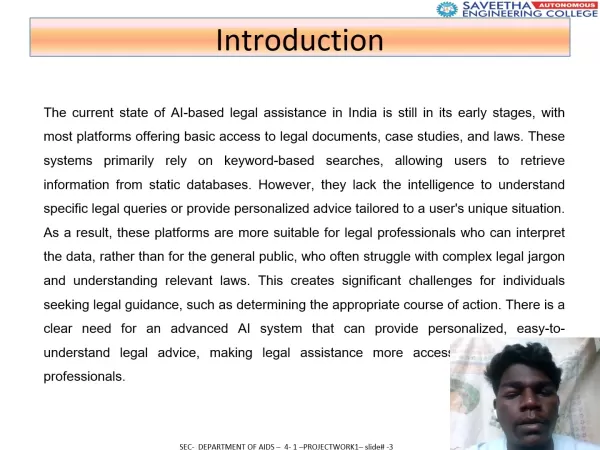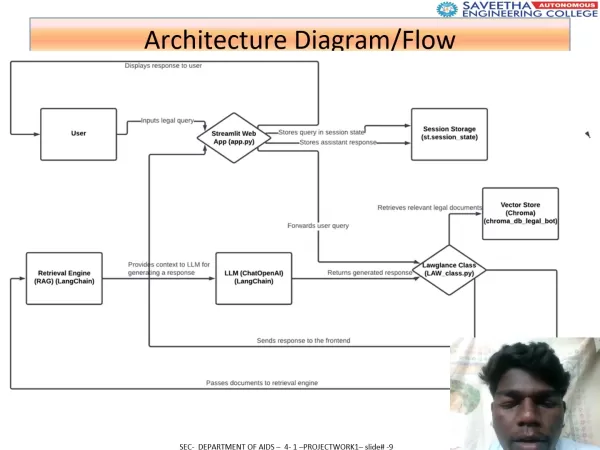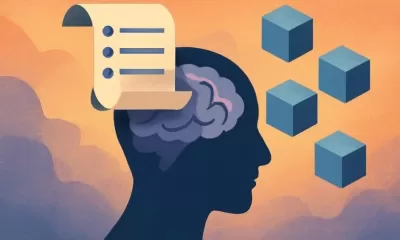AI-Driven Legal Assistant Transforms Legal Guidance Landscape
In the hustle and bustle of modern life, getting legal advice often feels like a daunting task—expensive, time-consuming, and wrapped in layers of complexity. Enter the AI-Driven Legal Assistant project from Saveetha Engineering College, which is set to transform how we access legal guidance. By harnessing the power of artificial intelligence, this initiative aims to demystify legal complexities and make preliminary legal advice more accessible to the general public. Dubbed the "AI Driven Legal Assistant," this project promises to bring AI-driven legal solutions right to your fingertips.
Key Highlights
- Transforming legal guidance with the help of AI.
- Tackling the shortcomings of existing legal platforms.
- Leveraging Natural Language Processing (NLP) and machine learning to fetch accurate legal data.
- Offering an intuitive interface for seamless access to legal information.
- Looking ahead to include multilingual support and voice interaction capabilities.
Introduction to AI-Driven Legal Assistance
The State of Legal AI in India
In India, AI-based legal tools are still finding their footing. Most platforms rely on basic keyword searches to pull up legal documents, case studies, and laws. But there's a catch—they often fall short in understanding nuanced legal queries or delivering personalized advice for individual scenarios. These tools are better suited for legal professionals who can navigate the complexities, leaving the general public grappling with legal jargon and struggling to understand applicable laws. This gap presents a real challenge for those in need of legal guidance, and that's where AI steps in to make a difference.

Bridging the Gap with AI
The 'AI Driven Legal Assistant' project is designed to overcome these hurdles by introducing a sophisticated AI system that simplifies legal guidance. It's all about making legal advice more accessible to everyone, empowering users to make informed decisions on legal matters. This AI-driven system aspires to be the go-to resource for legal assistance.
Ethical Considerations and Limitations
Understanding the Boundaries and Ethics
It's important to recognize the limitations and ethical considerations of this AI-driven legal assistant. It's meant to offer preliminary legal advice, not replace professional consultation. Ensuring user data privacy and maintaining transparency in AI responses are key, highlighting the importance of ethical AI practices. Remember, an AI chatbot doesn't hold the legal authority of a court of law.

Pros and Cons of Using LawGlance
Advantages
- Better access to legal information.
- Cost-effective solutions.
- Streamlined efficiency.
Disadvantages
- Provides only preliminary legal advice.
- Relies heavily on the quality of data.
- Risk of misinterpretation.
FAQ
What is the AI-Driven Legal Assistant?
The AI-Driven Legal Assistant is an innovative project from Saveetha Engineering College aimed at revolutionizing legal guidance accessibility. It uses AI to bridge the gap between complex legal information and the public, offering a user-friendly platform for preliminary legal advice. The goal is to enhance access to the legal system through AI, not to replace licensed attorneys.
Who is the target audience for this AI assistant?
The primary audience includes individuals seeking basic legal guidance, legal professionals needing quick references, and organizations looking for accessible legal information. These groups stand to gain the most from the assistant's features.
What core technologies are used in this project?
The project employs Retriever-Augmented Generation (RAG) for data retrieval, Natural Language Processing (NLP) for understanding queries, and scalable frameworks for efficient operations. These technologies enable the system to retrieve data by interpreting natural language.
What are the future enhancements planned for the assistant?
Future plans include expanding to cover international laws, adding multilingual support, incorporating more legal datasets like judgments and precedents, and introducing voice-based interaction and document analysis. The project is always evolving to meet user needs.
Related Questions
How does AI enhance legal assistance?
AI enhances legal assistance by making it more accessible and efficient. It uses NLP and machine learning to analyze user queries, retrieve relevant legal documents, and provide preliminary legal advice. This integration ensures the system is accurate, reliable, and easy to use.
Related article
 Manus Debuts 'Wide Research' AI Tool with 100+ Agents for Web Scraping
Chinese AI innovator Manus, which previously gained attention for its pioneering multi-agent orchestration platform catering to both consumers and professional users, has unveiled a groundbreaking application of its technology that challenges convent
Manus Debuts 'Wide Research' AI Tool with 100+ Agents for Web Scraping
Chinese AI innovator Manus, which previously gained attention for its pioneering multi-agent orchestration platform catering to both consumers and professional users, has unveiled a groundbreaking application of its technology that challenges convent
 Why LLMs Ignore Instructions & How to Fix It Effectively
Understanding Why Large Language Models Skip Instructions
Large Language Models (LLMs) have transformed how we interact with AI, enabling advanced applications ranging from conversational interfaces to automated content generation and programming ass
Why LLMs Ignore Instructions & How to Fix It Effectively
Understanding Why Large Language Models Skip Instructions
Large Language Models (LLMs) have transformed how we interact with AI, enabling advanced applications ranging from conversational interfaces to automated content generation and programming ass
 Pebble Reclaims Its Original Brand Name After Legal Battle
The Return of Pebble: Name and AllPebble enthusiasts can rejoice - the beloved smartwatch brand isn't just making a comeback, it's reclaiming its iconic name. "We've successfully regained the Pebble trademark, which honestly surprised me with how smo
Comments (14)
0/200
Pebble Reclaims Its Original Brand Name After Legal Battle
The Return of Pebble: Name and AllPebble enthusiasts can rejoice - the beloved smartwatch brand isn't just making a comeback, it's reclaiming its iconic name. "We've successfully regained the Pebble trademark, which honestly surprised me with how smo
Comments (14)
0/200
![KeithSanchez]() KeithSanchez
KeithSanchez
 September 25, 2025 at 2:30:42 PM EDT
September 25, 2025 at 2:30:42 PM EDT
Enfin une solution pour simplifier l'accès aux conseils juridiques ! 🤯 J'avais peur que l'IA remplace trop d'emplois, mais là c'est clairement un bon usage de la technologie. J'aimerais savoir si ça fonctionne aussi bien pour les petites querelles de voisinage que pour des affaires plus sérieuses...


 0
0
![AnthonyScott]() AnthonyScott
AnthonyScott
 August 4, 2025 at 2:48:52 AM EDT
August 4, 2025 at 2:48:52 AM EDT
This AI legal assistant sounds like a game-changer! Imagine getting quick, affordable advice without wading through legal jargon. Can't wait to see how it shakes up the industry! 😎


 0
0
![MatthewSmith]() MatthewSmith
MatthewSmith
 August 2, 2025 at 11:07:14 AM EDT
August 2, 2025 at 11:07:14 AM EDT
This AI legal assistant sounds like a game-changer! Imagine getting quick advice without draining your wallet. But I wonder, will it really understand tricky laws as well as a human lawyer? 🤔


 0
0
![BillyYoung]() BillyYoung
BillyYoung
 August 2, 2025 at 11:07:14 AM EDT
August 2, 2025 at 11:07:14 AM EDT
This AI legal assistant sounds like a game-changer! Affordable advice without the headache—count me in! 😄


 0
0
![BruceMiller]() BruceMiller
BruceMiller
 April 26, 2025 at 5:37:38 PM EDT
April 26, 2025 at 5:37:38 PM EDT
Un assistant juridique IA ? Trop cool ! 😊 Ça pourrait rendre le droit plus accessible, mais j’espère qu’il respecte bien les nuances des lois françaises.


 0
0
In the hustle and bustle of modern life, getting legal advice often feels like a daunting task—expensive, time-consuming, and wrapped in layers of complexity. Enter the AI-Driven Legal Assistant project from Saveetha Engineering College, which is set to transform how we access legal guidance. By harnessing the power of artificial intelligence, this initiative aims to demystify legal complexities and make preliminary legal advice more accessible to the general public. Dubbed the "AI Driven Legal Assistant," this project promises to bring AI-driven legal solutions right to your fingertips.
Key Highlights
- Transforming legal guidance with the help of AI.
- Tackling the shortcomings of existing legal platforms.
- Leveraging Natural Language Processing (NLP) and machine learning to fetch accurate legal data.
- Offering an intuitive interface for seamless access to legal information.
- Looking ahead to include multilingual support and voice interaction capabilities.
Introduction to AI-Driven Legal Assistance
The State of Legal AI in India
In India, AI-based legal tools are still finding their footing. Most platforms rely on basic keyword searches to pull up legal documents, case studies, and laws. But there's a catch—they often fall short in understanding nuanced legal queries or delivering personalized advice for individual scenarios. These tools are better suited for legal professionals who can navigate the complexities, leaving the general public grappling with legal jargon and struggling to understand applicable laws. This gap presents a real challenge for those in need of legal guidance, and that's where AI steps in to make a difference.

Bridging the Gap with AI
The 'AI Driven Legal Assistant' project is designed to overcome these hurdles by introducing a sophisticated AI system that simplifies legal guidance. It's all about making legal advice more accessible to everyone, empowering users to make informed decisions on legal matters. This AI-driven system aspires to be the go-to resource for legal assistance.
Ethical Considerations and Limitations
Understanding the Boundaries and Ethics
It's important to recognize the limitations and ethical considerations of this AI-driven legal assistant. It's meant to offer preliminary legal advice, not replace professional consultation. Ensuring user data privacy and maintaining transparency in AI responses are key, highlighting the importance of ethical AI practices. Remember, an AI chatbot doesn't hold the legal authority of a court of law.

Pros and Cons of Using LawGlance
Advantages
- Better access to legal information.
- Cost-effective solutions.
- Streamlined efficiency.
Disadvantages
- Provides only preliminary legal advice.
- Relies heavily on the quality of data.
- Risk of misinterpretation.
FAQ
What is the AI-Driven Legal Assistant?
The AI-Driven Legal Assistant is an innovative project from Saveetha Engineering College aimed at revolutionizing legal guidance accessibility. It uses AI to bridge the gap between complex legal information and the public, offering a user-friendly platform for preliminary legal advice. The goal is to enhance access to the legal system through AI, not to replace licensed attorneys.
Who is the target audience for this AI assistant?
The primary audience includes individuals seeking basic legal guidance, legal professionals needing quick references, and organizations looking for accessible legal information. These groups stand to gain the most from the assistant's features.
What core technologies are used in this project?
The project employs Retriever-Augmented Generation (RAG) for data retrieval, Natural Language Processing (NLP) for understanding queries, and scalable frameworks for efficient operations. These technologies enable the system to retrieve data by interpreting natural language.
What are the future enhancements planned for the assistant?
Future plans include expanding to cover international laws, adding multilingual support, incorporating more legal datasets like judgments and precedents, and introducing voice-based interaction and document analysis. The project is always evolving to meet user needs.
Related Questions
How does AI enhance legal assistance?
AI enhances legal assistance by making it more accessible and efficient. It uses NLP and machine learning to analyze user queries, retrieve relevant legal documents, and provide preliminary legal advice. This integration ensures the system is accurate, reliable, and easy to use.
 Manus Debuts 'Wide Research' AI Tool with 100+ Agents for Web Scraping
Chinese AI innovator Manus, which previously gained attention for its pioneering multi-agent orchestration platform catering to both consumers and professional users, has unveiled a groundbreaking application of its technology that challenges convent
Manus Debuts 'Wide Research' AI Tool with 100+ Agents for Web Scraping
Chinese AI innovator Manus, which previously gained attention for its pioneering multi-agent orchestration platform catering to both consumers and professional users, has unveiled a groundbreaking application of its technology that challenges convent
 Why LLMs Ignore Instructions & How to Fix It Effectively
Understanding Why Large Language Models Skip Instructions
Large Language Models (LLMs) have transformed how we interact with AI, enabling advanced applications ranging from conversational interfaces to automated content generation and programming ass
Why LLMs Ignore Instructions & How to Fix It Effectively
Understanding Why Large Language Models Skip Instructions
Large Language Models (LLMs) have transformed how we interact with AI, enabling advanced applications ranging from conversational interfaces to automated content generation and programming ass
 Pebble Reclaims Its Original Brand Name After Legal Battle
The Return of Pebble: Name and AllPebble enthusiasts can rejoice - the beloved smartwatch brand isn't just making a comeback, it's reclaiming its iconic name. "We've successfully regained the Pebble trademark, which honestly surprised me with how smo
Pebble Reclaims Its Original Brand Name After Legal Battle
The Return of Pebble: Name and AllPebble enthusiasts can rejoice - the beloved smartwatch brand isn't just making a comeback, it's reclaiming its iconic name. "We've successfully regained the Pebble trademark, which honestly surprised me with how smo
 September 25, 2025 at 2:30:42 PM EDT
September 25, 2025 at 2:30:42 PM EDT
Enfin une solution pour simplifier l'accès aux conseils juridiques ! 🤯 J'avais peur que l'IA remplace trop d'emplois, mais là c'est clairement un bon usage de la technologie. J'aimerais savoir si ça fonctionne aussi bien pour les petites querelles de voisinage que pour des affaires plus sérieuses...


 0
0
 August 4, 2025 at 2:48:52 AM EDT
August 4, 2025 at 2:48:52 AM EDT
This AI legal assistant sounds like a game-changer! Imagine getting quick, affordable advice without wading through legal jargon. Can't wait to see how it shakes up the industry! 😎


 0
0
 August 2, 2025 at 11:07:14 AM EDT
August 2, 2025 at 11:07:14 AM EDT
This AI legal assistant sounds like a game-changer! Imagine getting quick advice without draining your wallet. But I wonder, will it really understand tricky laws as well as a human lawyer? 🤔


 0
0
 August 2, 2025 at 11:07:14 AM EDT
August 2, 2025 at 11:07:14 AM EDT
This AI legal assistant sounds like a game-changer! Affordable advice without the headache—count me in! 😄


 0
0
 April 26, 2025 at 5:37:38 PM EDT
April 26, 2025 at 5:37:38 PM EDT
Un assistant juridique IA ? Trop cool ! 😊 Ça pourrait rendre le droit plus accessible, mais j’espère qu’il respecte bien les nuances des lois françaises.


 0
0





























